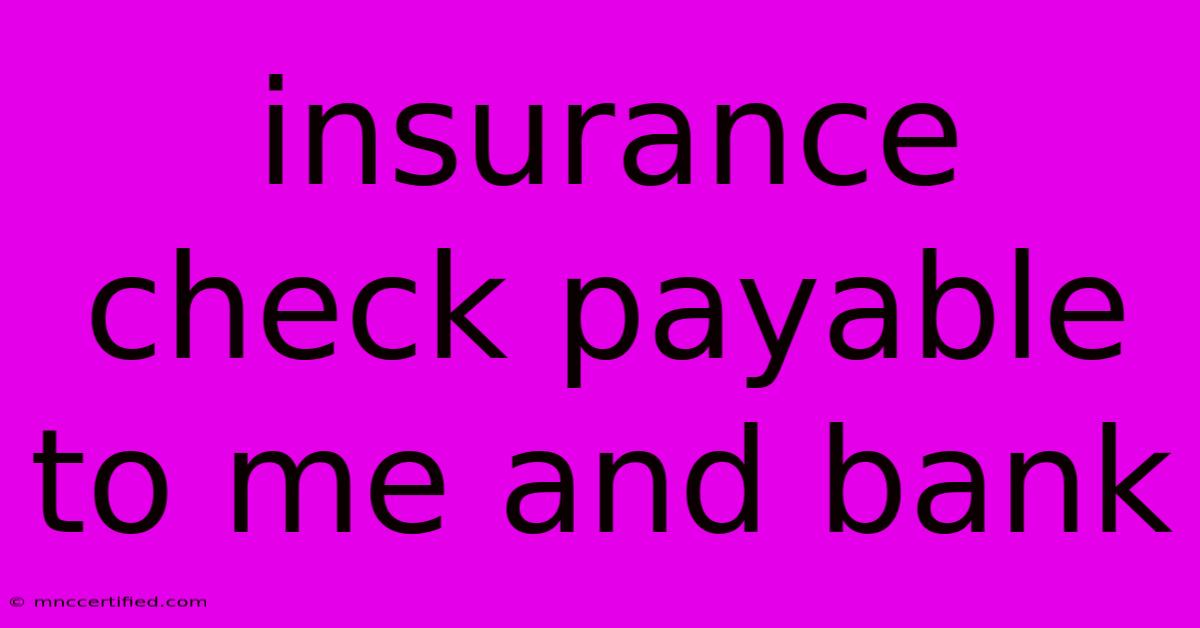Insurance Check Payable To Me And Bank

Table of Contents
Insurance Checks Payable to You and Your Bank: A Guide to Understanding and Handling Them
Receiving an insurance check can be a relief, but it can also raise questions, especially when the check is made payable to both you and your bank. This type of check, often referred to as a "joint payee" check, might seem unusual, but it serves a specific purpose: ensuring the funds reach your bank account securely.
Here's a detailed breakdown of what insurance checks payable to you and your bank are, why they are used, and how to handle them correctly:
Why is the Insurance Check Payable to Both You and Your Bank?
Insurance companies use joint payee checks for several reasons:
- Fraud Prevention: This practice significantly reduces the risk of fraudulent activities, like check forgery or theft. If the check is stolen, the thief won't be able to cash it without your signature, as the bank's endorsement is also required.
- Streamlining Payment Process: It simplifies the disbursement of funds. Instead of having to send separate checks to you and your bank, a single check covers both parties, saving time and effort.
- Ensuring Funds Reach Your Account: By requiring your bank's endorsement, the insurance company guarantees the funds will be deposited directly into your account, minimizing delays or potential loss.
How to Handle a Joint Payee Check
Here's what you need to do when you receive a joint payee check:
- Check the Details: Carefully review the check for accuracy. Verify your name, your bank's name, and the amount. Make sure the check isn't damaged or altered.
- Sign the Check: Sign your name in the designated space on the check.
- Endorsement by Your Bank: The bank will need to endorse the check as well. You can either take the check to your bank branch or, for added convenience, use mobile banking features to endorse the check remotely.
- Deposit the Check: Once endorsed by both you and your bank, deposit the check into your account.
Important Considerations
- Verification with Your Bank: If you have any doubts about the authenticity of the check or the process, contact your bank directly for clarification. They can guide you through the proper handling of the check.
- Negotiation: While some banks may accept joint payee checks for immediate cashing, it's generally advisable to deposit the check into your account.
Conclusion
Insurance checks payable to you and your bank are a common practice that ensures security and efficiency in fund disbursement. By understanding the process and following these steps, you can confidently handle these checks and access your insurance funds safely.
Remember: If you encounter any difficulties or have concerns about the check, consult with your insurance company or your bank for assistance.

Thank you for visiting our website wich cover about Insurance Check Payable To Me And Bank. We hope the information provided has been useful to you. Feel free to contact us if you have any questions or need further assistance. See you next time and dont miss to bookmark.
Featured Posts
-
Investment Management Firms In Chicago
Nov 09, 2024
-
Putins Strategy Gaining Leverage Over Trump
Nov 09, 2024
-
Indpeendent Trading Co Plum Sweatshirt
Nov 09, 2024
-
Heidenheim Wins Away Hearts 0 2 Report
Nov 09, 2024
-
Tony Todd Candyman Actor Passes Away At 69
Nov 09, 2024